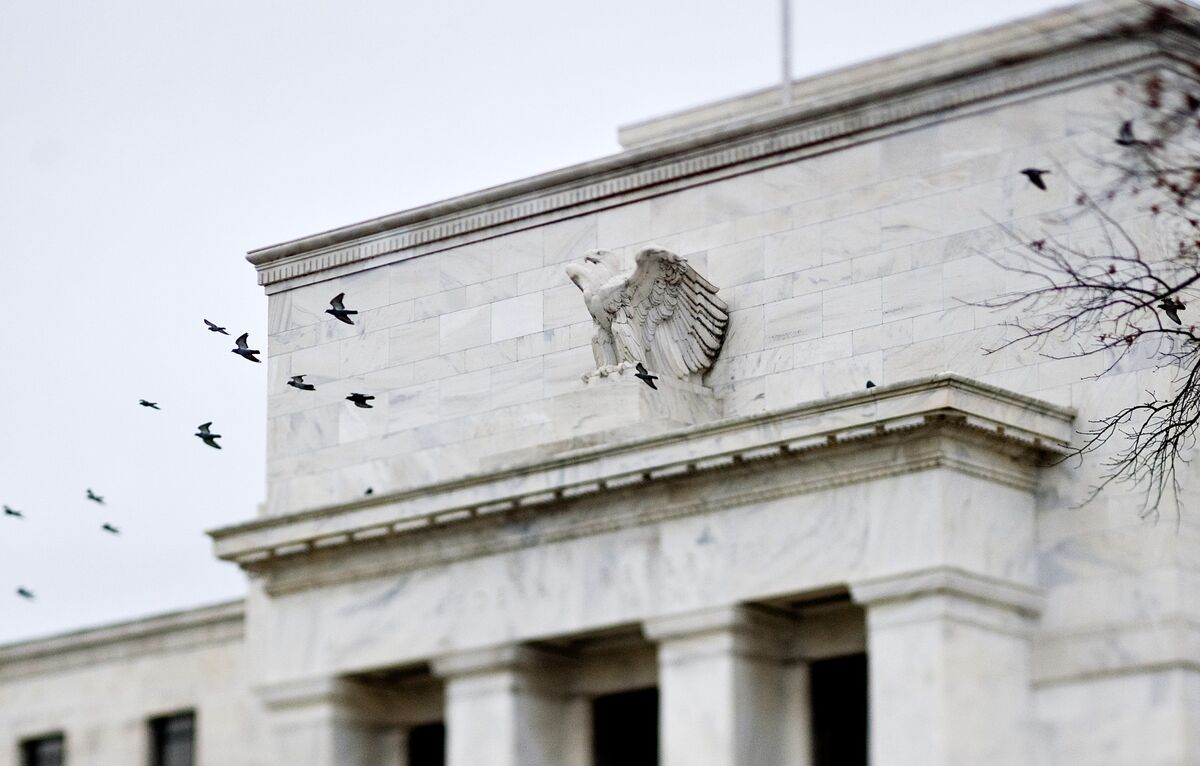Stock Markets
US banks push back as regulators prepare international capital hikes

U.S. banks are pushing to soften a major regulatory proposal to hike bank capital requirements, worried it could prove too onerous, especially for lenders still reeling from the March banking crisis, according to six people briefed on the matter.
Bank regulators led by the U.S. Federal Reserve are finalizing the proposal which would implement international capital standards agreed by the Basel Committee on Banking Supervision in the aftermath of the 2007-2009 financial crisis.
Bankers are particularly concerned by an aspect of the draft proposal that would apply higher capital charges on non-interest revenue, such as the fees lenders charge on credit cards or investment banking services.
That capital charge is part of the package agreed by the Basel Committee in 2017, but the industry says it overstates the risk for banks that have a high proportion of non-interest income and had hoped U.S. regulators would mitigate its impact, the people said.
Bank groups are pushing for regulators to cap the proportion of assets on which such charges would apply, said three people, but it was unclear if the agencies would take that approach.
Non-interest services income has been a key focus of many lenders’ growth strategies in recent years, one industry official noted.
American Express, Morgan Stanley and the U.S. units of UBS, Deutsche Bank and Barclays are among banks with a high proportion of non-interest income, according to a 2022 blog by Washington group the Bank Policy Institute.
Barclays, Deutsche Bank, and Morgan Stanley declined to comment. UBS and American Express did not immediately provide comment.
On Wednesday, Fed Chair Jerome Powell told Congress it was critical banks have strong capital, but regulators must be mindful of the tradeoffs.
WALL STREET CRACKDOWN
While the Basel rules were agreed years ago, the U.S. regulations to comply with them are being drafted in the wake of this year’s banking crisis in which deposit runs caused Silicon Valley Bank and two other lenders to fail. The proposal is the first major rule led by Fed Vice Chair for Supervision Michael Barr, who has launched a sweeping review of capital rules and is expected to be tough on Wall Street.
“The baseline has shifted to an assumption that the scale and scope of the proposal is going to be far more punitive than anyone expected at the end of last year,” said Isaac Boltansky, director of policy research for brokerage BTIG.
Industry executives argue the bank failures were caused by mismanagement and liquidity issues, and that system-wide capital is already ample.
The proposal is also expected to apply stiffer capital rules to smaller lenders with over $100 billion in assets, which would include some that experienced liquidity problems this year, three sources said.
Given investor jitters over the health of the industry and the broader economy, bankers say, hiking capital now could backfire, putting pressure on banks and hurting lending.
Republican officials at the agencies have flagged similar concerns, two people said, while Republican lawmakers on Wednesday also raised worries over capital rules with Powell.
“It’s extremely important for the agencies to be mindful of the economic costs at a time of great uncertainty,” said Kevin Fromer, CEO of the Financial Services Forum whose members, the country’s largest eight banks, have roughly $900 billion in common equity capital.
“It’s not in the interest of the U.S. economy to raise capital requirements on institutions that are already well-capitalized.”
The Fed is drafting the Basel rules with the Office of the Comptroller of the Currency (OCC) and Federal Deposit Insurance Corp. (FDIC). Regulators had hoped to unveil the proposal this month but staff are still working on the draft and the timeline has slipped to later in July, five people said.
The FDIC and OCC declined to comment.
Speaking to reporters last week, acting Comptroller Michael Hsu said banks had “not been shy about sharing their concerns” which regulators were taking into account.
Stock Markets
Rithm Capital stock target raised on growth prospects

On Friday, Argus increased its stock price target on Rithm Capital Corp. (NYSE: RITM) to $13.00, up from the previous $12.00, while reaffirming its Buy rating on the stock. The firm highlighted the company’s ongoing transformation and expansion efforts as the rationale behind the revised target price.
Rithm Capital, which rebranded from New Residential Investment Corp. in August 2022, has since transitioned to internal management after previously being managed by Fortress Investment Group. This change is part of a broader transformation of the company’s business model initiated following the financial crisis in late March 2020.
The company has been actively growing its mortgage servicing operations and seizing new debt-related investment opportunities. In its expansion efforts, Rithm Capital has acquired a 50% interest in GreenBarn Investment Group, a commercial real estate equity and debt investment management firm.
Further bolstering its portfolio, Rithm Capital has also made significant acquisitions, including purchasing $1.4 billion worth of Marcus consumer loans from Goldman Sachs for $145 million. Moreover, the company has completed the acquisition of Computershare Mortgage Services Inc. and its affiliates, including Specialized Loan Servicing LLC (SLS), for an approximate total of $720 million.
Completing its notable transactions, Rithm Capital finalized the acquisition of the $33 billion alternative asset manager Sculptor Capital Management (NYSE:) in the fourth quarter of 2023. These strategic moves have contributed to the firm’s positive outlook on Rithm Capital’s stock and its increased price target.
InvestingPro Insights
In light of Argus’s stock recent price target increase for Rithm Capital Corp. (NYSE: RITM), InvestingPro data further supports the optimistic outlook. Rithm Capital’s market capitalization stands at a robust $5.55 billion, while maintaining an attractive P/E ratio of 7.41, indicating that the stock may be undervalued relative to its earnings.
remove ads
.
The company’s significant dividend yield of 8.73% as of the last recorded date, coupled with a history of maintaining dividend payments for 12 consecutive years, reflects a strong commitment to shareholder returns.
InvestingPro Tips suggest that while analysts have revised earnings downwards for the upcoming period, the company’s stock price movements have been quite volatile, trading near its 52-week high. This could present opportunities for investors looking for value plays with substantial dividend income.
Moreover, with a notable year-to-date price total return of 9.73%, and an impressive 55.73% return over the last year, Rithm Capital’s performance has been strong. For those seeking more in-depth analysis, there are additional InvestingPro Tips available at https://www.investing.com/pro/RITM, offering insights that could help investors make more informed decisions.
Use the exclusive coupon code PRONEWS24 to receive an additional 10% off a yearly or biyearly Pro and Pro+ subscription, unlocking even more valuable insights to guide your investment strategy.
This article was generated with the support of AI and reviewed by an editor. For more information see our T&C.
Stock Markets
JPMorgan maintains overweight on CK Infrastructure, steady HK$50 target

On Friday, JPMorgan upheld its Overweight rating on CK Infrastructure Holdings (1038:HK) (OTC: CKISY) with a consistent price target of HK$50.00. The firm’s analysis was based on a review of the company’s financial year 2023 results and current operating trends. Adjustments were made to the earnings forecasts for the years 2024 and 2025, with a slight reduction for 2024 by 2% and an increase for 2025 by 2%. These revisions take into account the influence of regulatory changes, inflation, and fluctuating exchange rates on the company’s regulated assets, particularly in the United Kingdom, Australia, and other regions.
The updated model reflects the latest developments and anticipates the potential financial impact on CK Infrastructure. The firm has decided to roll forward its price target to June 2025, while maintaining the previous target of HK$50. The Overweight rating suggests that JPMorgan continues to view the stock favorably in comparison to the sector average.
CK Infrastructure Holdings, which operates a diversified portfolio of infrastructure businesses, has been assessed for its performance and outlook in light of various external factors. The company’s exposure to regulatory resets and economic conditions in different geographies necessitates a nuanced understanding of its earnings potential.
The revised earnings estimates are a direct result of the firm’s comprehensive evaluation of the company’s regulated assets. These assets, which are subject to oversight by regulatory bodies, can be affected by policy changes and economic shifts, such as inflation and currency exchange rates.
JPMorgan’s reaffirmation of the Overweight rating indicates confidence in CK Infrastructure’s ability to navigate the complexities of its operating environment. The price target of HK$50 remains unchanged, signaling the firm’s belief in the company’s value proposition and its prospects for the future.
remove ads
.
This article was generated with the support of AI and reviewed by an editor. For more information see our T&C.
Stock Markets
Ashland shares target raised on improving demand

On Friday, Argus maintained a Buy rating on Ashland Inc . (NYSE: NYSE:) and increased the stock’s price target to $118 from $109. This adjustment suggests a potential total return of approximately 21%, including dividends, based on the current share prices.
The specialty chemicals and additives provider has experienced underwhelming operational and financial performance over recent quarters, including the second quarter of 2024. This was attributed to slower economic growth in key regions such as China, Europe, and parts of Asia. These areas faced challenges due to soft customer demand and ongoing inventory destocking by suppliers, which adversely affected Ashland’s revenue and profit margins.
Despite these challenges, there have been positive signs in the last quarter indicating a shift in market conditions. Ashland’s management has reported a gradual increase in demand across most of the company’s end markets.
According to Argus, this improvement is a result of the destocking cycle nearing its end and customer demand beginning to rise, which are seen as favorable trends for Ashland’s future growth.
The revised stock price target reflects the analyst’s confidence in Ashland’s recovery trajectory as the market dynamics that previously hindered the company’s performance are starting to reverse. The upward revision in the price target is based on the expectation of a continued recovery in customer demand patterns and the conclusion of inventory destocking.
Investors and market watchers will be monitoring Ashland’s progress closely, as the company aims to capitalize on the improving demand in its various markets and work towards delivering value to its shareholders.
remove ads
.
InvestingPro Insights
As Argus maintains a positive outlook on Ashland Inc. (NYSE: ASH), highlighting the potential for a 21% total return, InvestingPro data provides additional insights into the company’s financial health and market performance.
Ashland’s management’s aggressive share buyback strategy and a high shareholder yield are noteworthy, as noted by InvestingPro Tips. Furthermore, the company’s consistent dividend growth, with dividends raised for five consecutive years and maintained for 54 years, underscores its commitment to shareholder returns.
From a market perspective, Ashland’s stock is trading near its 52-week high, with analysts predicting profitability for the year. The company’s strong liquidity position, with liquid assets surpassing short-term obligations, is reassuring for investors.
Key financial metrics include a market capitalization of $4.98 billion, a P/E ratio of 26.25, and a dividend yield of 1.64%. Despite a decline in revenue growth over the last twelve months, the stock has experienced a significant price uptick, with a 29.41% total return over the last six months.
For those considering a deeper analysis of Ashland, InvestingPro offers additional insights. There are currently 11 more InvestingPro Tips available for Ashland Inc., which can be accessed by visiting https://www.investing.com/pro/ASH. To enhance your investing strategy with these insights, use coupon code PRONEWS24 to get an additional 10% off a yearly or biyearly Pro and Pro+ subscription.
This article was generated with the support of AI and reviewed by an editor. For more information see our T&C.

 Forex2 years ago
Forex2 years agoForex Today: the dollar is gaining strength amid gloomy sentiment at the start of the Fed’s week

 Forex2 years ago
Forex2 years agoHow is the Australian dollar doing today?

 Forex1 year ago
Forex1 year agoUnbiased review of Pocket Option broker

 Forex2 years ago
Forex2 years agoDollar to pound sterling exchange rate today: Pound plummeted to its lowest since 1985

 Cryptocurrency2 years ago
Cryptocurrency2 years agoWhat happened in the crypto market – current events today

 World2 years ago
World2 years agoWhy are modern video games an art form?

 Stock Markets2 years ago
Stock Markets2 years agoMorgan Stanley: bear market rally to continue

 Economy2 years ago
Economy2 years agoCrude oil tankers double in price due to EU anti-Russian sanctions































